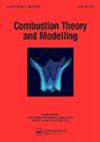Numerical simulation of turbulent premixed flames with the conditional source-term estimation model using Bernstein polynomial expansion
IF 1.6
4区 工程技术
Q4 ENERGY & FUELS
引用次数: 0
Abstract
AbstractConditional Source-term Estimation (CSE) is a turbulence-chemistry interaction model similar to CMC, except that the conditional scalars are calculated from unconditional ones using an integral equation. This problem is inherently ill-posed and should be regularised. Recently, an efficient regularisation approach based on Bernstein polynomial expansion was proposed by Mahdipour and Salehi (Combust. Flame, 2022) in an a priori analysis using DNS data. This work implements this approach in a reacting flow solver, and two laboratory-scale turbulent premixed flames are simulated in the Reynolds-Averaged Navier-Stokes (RANS) context. The turbulent intensity in the first flame is low, and the results show that, unlike the conventional CSE approach, the new approach can accurately predict the flamelet conditional averages. Furthermore, the predicted averaged velocity field and major and minor species mass fractions compare favourably with the experimental measurements. The turbulent intensity in the second flame is relatively higher, and the predicted conditional averages should deviate from an unstrained laminar flame solution. The new approach can correctly predict this trend as well as the flame height in this flame. The computational cost of the new CSE approach is also substantially reduced compared to the regular CSE approach.Keywords: turbulent combustionpremixed flamestabulated chemistryconditional moment closureconditional source-term estimation Disclosure statementNo potential conflict of interest was reported by the author(s).用Bernstein多项式展开的条件源项估计模型对湍流预混火焰进行数值模拟
【摘要】条件源项估计(CSE)是一种类似CMC的湍流-化学相互作用模型,不同之处是条件标量由无条件标量用积分方程计算而成。这个问题本质上是病态的,应该加以规范。最近,Mahdipour和Salehi (comust)提出了一种基于Bernstein多项式展开的高效正则化方法。Flame, 2022),使用DNS数据进行先验分析。这项工作在反应流求解器中实现了这种方法,并在reynolds - average Navier-Stokes (RANS)环境中模拟了两个实验室规模的湍流预混火焰。结果表明,与传统的CSE方法不同,该方法可以准确地预测小火焰条件平均。此外,预测的平均速度场和主要和次要物种质量分数与实验结果比较吻合。第二火焰中的湍流强度相对较高,并且预测的条件平均值应该偏离非应变层流火焰解。新方法可以准确地预测这一趋势以及火焰高度。与常规CSE方法相比,新的CSE方法的计算成本也大大降低。关键词:湍流燃烧预混燃烧确定化学条件力矩闭合条件源项估计披露声明作者未报告潜在的利益冲突。
本文章由计算机程序翻译,如有差异,请以英文原文为准。
求助全文
约1分钟内获得全文
求助全文
来源期刊

Combustion Theory and Modelling
工程技术-工程:化工
CiteScore
3.00
自引率
7.70%
发文量
38
审稿时长
6 months
期刊介绍:
Combustion Theory and Modelling is a leading international journal devoted to the application of mathematical modelling, numerical simulation and experimental techniques to the study of combustion. Articles can cover a wide range of topics, such as: premixed laminar flames, laminar diffusion flames, turbulent combustion, fires, chemical kinetics, pollutant formation, microgravity, materials synthesis, chemical vapour deposition, catalysis, droplet and spray combustion, detonation dynamics, thermal explosions, ignition, energetic materials and propellants, burners and engine combustion. A diverse spectrum of mathematical methods may also be used, including large scale numerical simulation, hybrid computational schemes, front tracking, adaptive mesh refinement, optimized parallel computation, asymptotic methods and singular perturbation techniques, bifurcation theory, optimization methods, dynamical systems theory, cellular automata and discrete methods and probabilistic and statistical methods. Experimental studies that employ intrusive or nonintrusive diagnostics and are published in the Journal should be closely related to theoretical issues, by highlighting fundamental theoretical questions or by providing a sound basis for comparison with theory.
 求助内容:
求助内容: 应助结果提醒方式:
应助结果提醒方式:


